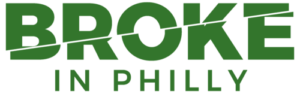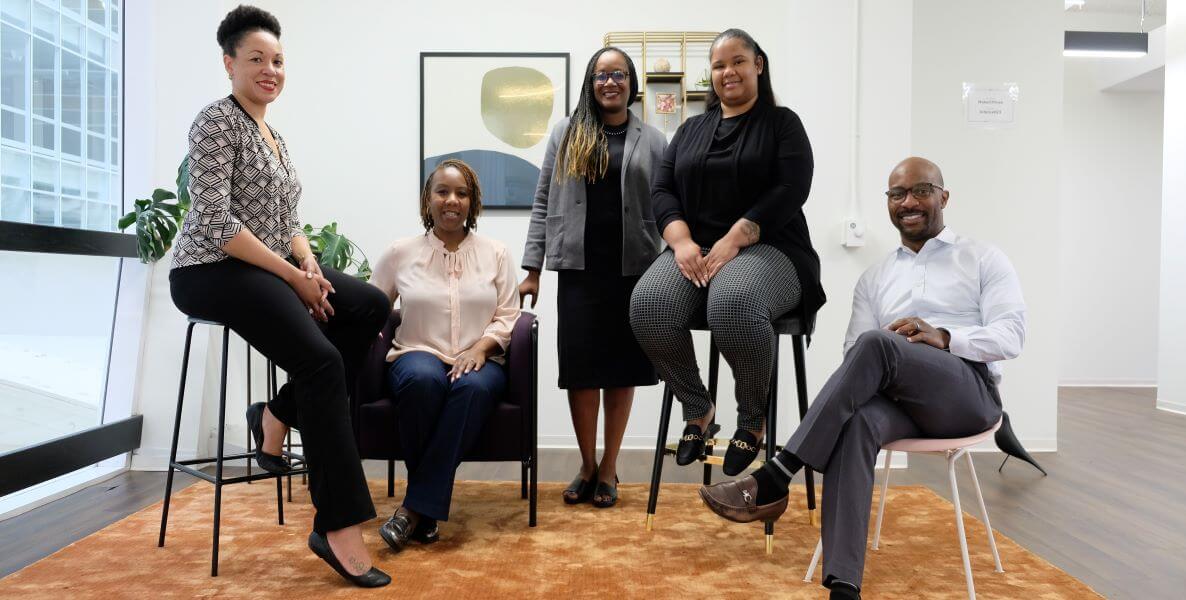When Olan Soremekun, M.D., worked in emergency rooms, he saw at least one person struggling with first-trimester pregnancy symptoms, like severe nausea or fatigue, every single shift. Some women came in because transportation issues caused them to miss their OB-GYN appointments. Others came because they were still concerned over symptoms their doctors had dismissed.
It didn’t matter where he was: Soremekun had been a physician in many cities, at hospitals in New York, Boston and Nashville, before ending up at Jefferson University Hospital in Philly. People across the country were struggling to find the support they needed during pregnancy. And one particular case has always stuck with him.
A woman had come into his ER because she’d missed an ultrasound and wasn’t able to reschedule her appointment for a time that worked with her busy work schedule. She wanted reassurance that she and her baby were both healthy. So, she drove to the ER, and settled into the waiting room.
“People should not have to wait a couple of hours to come into the emergency department for reassurance that they’re okay, that their future baby is okay,” Soremekun says.
The West Philly-based business started treating patients in early 2021 and has since improved pregnancy outcomes for almost 1,000 women in the city.
These were issues, he noticed, that primarily affected low-income women and women of color. Nationwide, the maternal mortality rate was 23.8 deaths per 100,000 live births in 2020, the CDC reports. Compared to White women, Black and Indigenous women are two to three times more likely to die from pregnancy-related complications.
The situation is equally bleak in Philly, where African Americans comprise 41 percent of the population, and 43 percent of all births, yet pregnant African-American women make up 73 percent of our city’s maternal mortality rate.
Maternal health care is a matter that is both personal and professional for Soremekun. When his wife was pregnant with their first child in 2020, the couple struggled to navigate prenatal health care. Her pregnancy had a positive outcome. The couple now has two healthy sons. But Soremekun thought if he and his wife — both physicians — had difficulty with the system, how were people without medical backgrounds faring?
“The more I looked at the numbers, the more seriously infuriated I got,” he says. “It just led me to really think through how could I use my skill set to build a company that can truly tackle the problem?”
So at the end of 2020, he launched Cayaba Care, a maternal health startup that provides wraparound support during pregnancy for little to no cost. The West Philly-based business started treating patients in early 2021 and has since improved pregnancy outcomes for almost 1,000 women in the city. In May, Cayaba Care raised $12 million in series A funding to expand its operations out of state.
Based on his experiences as an ER doctor, Soremekun designed the startup’s services to address issues such as missed OB-GYN appointments or first trimester symptoms by providing a continuous line of communication with medical professionals — and by bringing care to patients in their homes.
The Cayaba Care plan
When a patient signs up for a free Cayaba Care membership, they’re partnered with one of the company’s eight maternity navigators, medical assistants who have been trained in prenatal and postpartum care, meet with patients regularly in the patients’ homes, and connect them with resources.
Maternity navigators aren’t meant to replace a pregnant person’s physician. Rather, they’re there to serve as another resource for support during the prenatal and postpartum periods. Cayaba Care providers record any information the patient shares during home visits into the Cayaba Brain app, so that it can be easily shared with their OB-GYN.
Cayaba Care’s goal is to provide holistic care throughout the entire pregnancy. A patient with a medical question might be referred to one of Cayaba Care’s 30 clinical and support staff members, ranging from nurse practitioners to OB-GYNs and clinical psychiatrists and social workers.
A maternity navigator might schedule an appointment with an OB-GYN. Someone who is struggling to find insurance coverage or to pay bills would be paired with one of the company’s social workers. The company also provides medical equipment, like home blood pressure cuffs, which they teach patients how to use in order to continue to monitor their health in the home.
“People should not have to wait a couple of hours to come into the emergency department for reassurance that they’re okay, that their future baby is okay,” Soremekun says.
Cayaba’s home visits typically follow a schedule that aligns with the milestones of pregnancy — trimester start and end dates, major anatomy scans, etc.— but patients can request as many appointments as they need and can contact their maternity navigator anytime by phone, text and video calls.
“We want to understand and see the holistic needs of the patient,” Soremekun says. “If you think about the challenges in terms of getting into an office or having a patient come to you — transportation, childcare, lost work, wages, all those other factors — that is why a lot of patients might not seek care.”
Each year, transportation issues cause about 3.6 million people to miss medical appointments, Penn Medicine reports. Lack of childcare, transportation and lack of support are some of the main reasons providers believe that pregnant women miss appointments, per a 2015 study published in the National Library of Medicine.

Soremekun, who immigrated to the U.S. from Nigeria as a child, derived the name Cayaba Care from the Yoruba’s word “ayaba” which means “queen.” He intentionally wanted the name to be Cayaba Care and not Cayaba Health because he felt that “care” better reflected the company’s holistic mission, which includes social and mental support.
Lead maternity navigator Sharlene Rivera wishes that a holistic care option had been available to her during her pregnancies. She experienced symptoms of preeclampsia, a pregnancy complication characterized by elevated blood pressure that may cause organ damage if left untreated. But she never received a diagnosis — and didn’t know how to question her doctors when she didn’t receive support for her concerns. Luckily, her baby was delivered safely at 38 weeks via C-section. Later, during another one of her pregnancies, she had a doctor who prescribed her aspirin, which is commonly used to prevent or delay the onset of preeclampsia, but the physician never explained to Rivera why she needed to take it.
Rivera came to her role at Cayaba Care after working as a surgical scheduler, paramedical examiner, billing specialist, and medical assistant. She loves how her position at Cayaba Care provides patients with the care she wished she had been able to receive. She’s helped women develop home care plans for preeclampsia and soothed anxieties women have faced about childcare and motherhood.
“Through my experiences as both a patient and staff member in medical facilities, I’ve often seen how patients who have the greatest needs, particularly those on Medicaid, are rarely given the attention or services they require for better outcomes,” she says in an email.
“As I got older and learned more in my medical career, I learned about holistic care and how that could have helped me during my own pregnancy: nutrition, emotional health, social support, and much more.”
“I’m excited to continue to serve more moms and families,” Soremekun says. “I think we’re in a very interesting time in terms of tackling some of the inequities that exist in the healthcare system.”
One experience that was particularly rewarding for Rivera: helping a woman make a plan to manage preeclampsia.
The patient had received a preeclampsia diagnosis from her OB, but didn’t understand how dangerous the condition was to her health. She was the mother of another young child and felt she didn’t have time to do regular blood pressure screenings or attend prenatal check-ups.
During a home visit, Rivera noticed the patient’s blood pressure was abnormally high. The two women sat down and discussed how important it was to treat preeclampsia, how elevated blood pressure could lead to a stroke. Rivera explained everything she wished her own doctors had told her about preeclampsia.
Together, they developed strategies so that the patient could find time to adhere to her care plan and take her medications. Rivera continued to check in regularly, which helped the patient stay on track. “She was able to stay healthy throughout her pregnancy and postpartum,” Rivera says.
Positive outcomes for mothers and families
Cayaba Care began seeing patients last February and has since served over 1,000 Philadelphians. Eighty-five percent of the startup’s patients are people of color, 65 percent are Black and about 20 percent are Hispanic. The company reaches out to prospective patients by working with local nonprofits, hospitals, churches, high schools, state and city agencies and private practices to identify pregnant people who may need additional support and refer them to the service. They also ran digital ads on Facebook, Instagram and Google.
Company data shows that Cayaba Care’s model resulted in a 35 percent reduction in ER visits for their patients. Cayaba Care members are also three times more likely to attend their scheduled OB-GYN appointments. The company is currently working with researchers at Penn to further study how its holistic care model affects pregnancy outcomes.
Membership is free. The company’s goal is to keep its services low or no cost to remain accessible and partner with Medicaid in Pennsylvania and New Jersey. If a patient doesn’t have insurance, one of Cayaba Care’s social workers will help them find a policy they can afford.
They also partner with hospital systems, including Einstein and Penn, to provide holistic support to pregnant patients. And they’re working with nonprofits to connect patients with free or low-cost baby supplies, including car seats, breast pumps, formula and diapers. After the baby is born, Cayaba Care stays in touch with patients to provide breastfeeding support and address postpartum physical and mental health concerns.
The company isn’t profitable yet, but Soremekun expects it will be in the Philly market by the end of the year. They plan to use the $12 million they received in May from a number of investors, including Seae Ventures and Kapor Capital, to expand to other cities within the next 12 to 18 months.
This builds on the $3,000,000 in seed funding it raised last year. Plans aren’t definite, but they’re considering cities in Virginia, Tennessee, North Carolina, Illinois and Maryland. They’re looking to launch in two to three larger cities and will continue to focus on reaching Black and Brown communities.
“I’m excited to continue to serve more moms and families,” Soremekun says. “I think we’re in a very interesting time in terms of tackling some of the inequities that exist in the healthcare system.”
![]() RELATED HEALTH CARE COVERAGE FROM THE CITIZEN
RELATED HEALTH CARE COVERAGE FROM THE CITIZEN
MOST POPULAR ON THE CITIZEN RIGHT NOW
Cayaba Care staff: Dr. Fleming, OBGYN, Ivana, a social worker, Dr. Jackson, clinical psychiatrist, Nadria, a maternity navigators, and founder Olan Soremekun, M.D.


